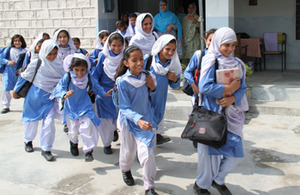Helping girls get an education
How small stipends from UK aid are helping thousands of girls get an education in Pakistan

Schoolgirls who receive the cash stipend at Sajikot Government Girls Primary School in Abbottabad, Pakistan. Picture: Vicki Francis/DFID
Sadia Noor lives in Abbottabad, Pakistan. Thanks to the support she received from UK aid while she was at high school she is now working as a teacher in a local school.
Girls get an education in Pakistan
When I was younger my family couldn’t support my education, the stipend helped me. When I got admission to college I got a job teaching, which supported my studies. Now I teach maths to classes 9 and 10.
I love teaching. It’s a very good profession because you get respect, and you get a chance to learn more yourself. Because I’m literate, I can educate other girls in my community. I have a motive, which helps me teach these children. My motive is to educate children like myself so they can stand on their own two legs as well.
A helping hand
In Pakistan, two-thirds of women are illiterate, and more than 9 million girls do not go to school.
In Khyber Pakhtunkhwa, the part of Pakistan which borders Afghanistan, conflict and military offensives over recent years have meant that more than 1 million children have had their education interrupted - either because they had to move away from the conflict areas or had their schools taken over as shelters.
Despite these barriers, enrolment of girls in primary schools in the region has increased over the last few years, and drop out rates have decreased. This is thanks, in part, to cash stipends, free text books, and other support from UK aid.
By 2015, across Pakistan, the UK intends to:
- get 4 million more children into school (around half of them girls)
- supply more than 6 million text books sets (around half of them will go to girls)
- construct or rehabilitate more than 43,000 classrooms, half of which will benefit girls
- construct new schools in conflict affected border areas which will benefit 6,500 girls; and in earthquake affected areas benefiting a further 3,874 girls
Help for the whole family
The UK has already helped more than 590,000 girls in Khyber Pakhtunkhwa stay in school over the last few years by giving them small cash stipends.
Each girl receives 200 rupees (about £1.50) a month, and a set of free textbooks each year to help them get an education.
With an average family size of up to 7 or 8 and a third of the population living on less than $1 a day, these small stipends and free text books can make the difference between daughters being sent to school or having to drop out.
Headteachers across the region attribute increased enrolment, decreased drop-out rates, and decreased absenteeism to the stipends and free textbooks.
Investing in educating girls is transformational – for themselves, their family, and their community.
Girls who are educated are more likely to:
- earn more money - an extra year of schooling can increase their wage by up to 20%
- marry later – a girl who attends secondary school is less likely to marry during her teenage years
- have a better understanding of family planning – a women has 1 less child for every 4 years of schooling
- have children later - girls aged 15 to 19 years are twice as likely to die during pregnancy compared with women aged 20 to 24
- have better health – women will get immunisation and other health treatments for themselves and their children